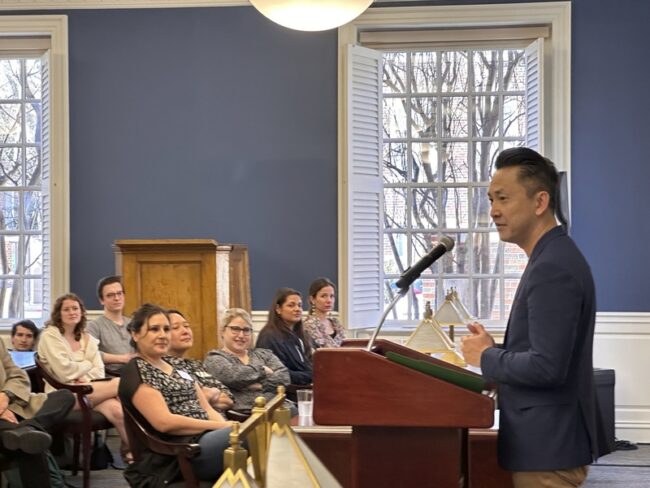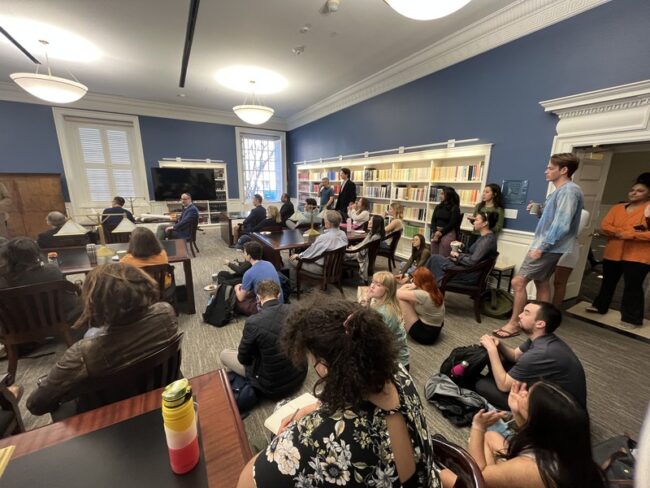In his introduction of Pulitzer Prize-winner Viet Thanh Nguyen, Professor of Chicanx and Asian American literature Jayson Gonzales Sae-Saue said, “We need artists more than ever who are able to imagine and to render contradiction expressible, ones able to employ imagination and able to explore the messy paradoxes that constitute the stuff of history and of memory.”
Or, in Nguyen’s own words: “I set out to offend everyone.”

“The Sympathizer” is Nguyen’s debut novel and the recipient of the 2016 Pulitzer Prize for Fiction. The narrative is darkly satirical, wrought with nuance, and most of all: relentlessly political. It crafts its politics within the form of the novel, which is an epistolary confession told by an anonymous narrator. The narrator, a North Vietnamese spy in the South Vietnamese army, possesses expertise in guiding the reader through the intimate contradictions of the American identity and the bitter and violent realities of the Vietnam War.
Throughout the novel, the narrator responds to a variety of American-centric rewritings and delusions of the war.
“This is a country built on genocide, slavery, and conquest,” Nguyen said, in conversation with poet laureate Natasha Trethewey. “It’s an open secret.”
“The Sympathizer” excels in its use of humor as a tool for politics. “Although every country thought itself superior in its own way, was there ever a country that coined so many “super” terms from the federal bank of its narcissism, was not only superconfident, but also truly superpowerful, that would not be satisfied until it locked every nation of the world into a full nelson and made it cry Uncle Sam?”
The narrator’s deft commentary is made possible by the duality of his identity. His race, nationality, education, and political affiliation all straddle the lines of Eastern and Western, Vietnamese and American, and Northern revolutionary and Southern expatriate. The narrative’s genre, too, juggles several identities, vacillating between spy thriller, historical fiction, and immigrant novel, to name a few.

Nguyen’s authorial voice is potent, and he catalogs the cruelty of the narrator’s bifurcated experiences with a disarming self-awareness. “My mother was native, and my father was foreign, and strangers and acquaintances had enjoyed reminding me of this ever since my childhood, spitting on me and calling me bastard, although sometimes, for variety, they called me bastard before they spit on me.” Nguyen’s prose often does its own kind of thematic work, shifting from deep solemnity to a searing cleverness within a single sentence.
Perhaps one of the most praised aspects of “The Sympathizer” is its depiction of war, removing the film of American misrepresentation. “Military amputees flapped empty sleeves like flightless birds, mute elderly beggars fixed cobra eyes on you, street urchins told tales taller than themselves about their pitiable conditions, young widows rocked colicky babies whom they might have rented, and assorted cripples displayed every imaginable, unappetizing illness known to man.” The narrative is visceral and unapologetic in the ways the Western imagination willingly forgets the fallout of its involvement with global atrocities and inhumanities.
“The Sympathizer” is a war novel intent on remembering, both in plot and in form. Nguyen read aloud sections of the book in Bridwell Library on his visit last Wednesday. As he did so, he provoked a harsh visualization of war to a crowd of several SMU students, many of whom were likely unconscious of the fact that they have been alive for as long as the U.S. has been involved in a war.
Nguyen jokes about the fact that “The Sympathizer” is political and provocative. Yet, the novel is far from provocative for the sake of being so. The ideological intentionality makes this story effective. “Art could not be separated from politics, and politics needed art in order to reach the people where they lived, through entertaining them,” the narrator recalls near the end of the book.
Although Nguyen intended to offend (or so he claims), he has received in return a promising hallmark of validation: an HBO miniseries adaptation of “The Sympathizer” starring Robert Downey Jr. and Sandra Oh.
The novel is an example of literature that seeks to resolve tensions of the present by remembering the past. It crafts a narrative based on memory and candid acknowledgment of history to sculpt possibilities of imagining the future more clearly. So, although this will be the story to bring Iron Man back to the screen, consider reading “The Sympathizer,” for its own sake.




















